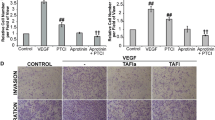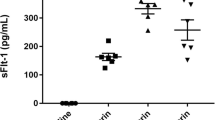Abstract
Angiostatin®, a 38-kD fragment of plasminogen, inhibits angiogenesis in both animal tumor models and in vitro endothelial cell models. However, human Angiostatin® has not been tested in vitro against an intact human tissue target to determine its ability to inhibit the initiation or subsequent promotion of the human angiogenic response. We hypothesized that high doses of human Angiostatin® would inhibit the development of an angiogenic response in an intact human vessel target, and would suppress the subsequent growth of blood vessels following the initiation of an angiogenic response. To test these hypotheses, full-thickness human placental vein disks were cultured for 15 days in an in vitro fibrin–thrombin clot assay. This assay system had been used to evaluate the efficacy of a wide variety of compounds. Vessels were obtained from three placentas. Treatments included a control medium plus fetal bovine serum (FBS), heparin–steroid (300 μg/ml heparin and 350 μg/ml hydrocortisone; a treatment known to inhibit angiogenesis) and Angiostatin® at doses from 1 × 10−4 to 1 × 10−9 M. In the control groups, 81% of vessels initiated an angiogenic response compared to 53% of the vessels treated with heparin–steroid. Angiostatin®(10−4–10−9 M) decreased the initiation of an angiogenic response, but this was not statistically significant. Of the disks that initiated an angiogenic response, the mean (± standard error of the mean (SEM)) semi-quantitative visual angiogenic index (AI) of the control vessels was 9 ± 1.7 on day 15. In comparison, the mean AI of heparin–steroid treated vessels was 3.7 ± 0.4. Angiostatin® at doses of 10−4–10−9 M also failed to inhibit blood vessel growth after initiation of the angiogenic response. Based on these observations, we cannot demonstrate significant activity of human Angiostatin®(10−4–10−9 M) against the initiation or promotion of a human angiogenic response in this in vitro model of angiogenesis using an intact human vessel target.
Similar content being viewed by others
References
Folkman J. Tumor angiogenesis: Therapeutic implications. N Engl J Med 1971; 285(21): 1182–6.
Hamada J, Cavanaugh PG, Lotan O, Nicolson GL. Separable growth and migration factors for large-cell lymphoma cells secreted by micro vascular endothelial cells derived from target organs for metastasis. Br J Cancer 1992; 66(2): 349–54.
Nicosia RF, Tchao R, Leighton J. Interactions between newly formed endothelial channels and carcinoma cells in plasma clot culture. Clin Exp Metastasis 1986; 4(2): 91–104.
O'Reilly MS, Holmgren L, Shing Y et al. Angiostatin®: A circulating endothelial cell inhibitor that suppresses angiogenesis and tumor growth. Cold Spring Harbor Symp Quant Biol 1994; 59: 471–82.
O'Reilly MS, Holmgren L, Shing Y et al. Angiostatin®: A novel angiogenesis inhibitor that mediates the suppression of metastases by a Lewis lung carcinoma. Cell 1994; 79(2): 315–28.
O'Reilly MS, Rosenthal R, Sage EH et al. The suppression of tumor metastases by a primary tumor. Surg Forum 1993; 44: 474–6.
O'Reilly MS. Angiostatin®: An endogenous inhibitor of angiogenesis and of tumor growth. In Goldberg ID, Rosen EM (eds): Regulation of Angiogenesis. Review. Basel, Switzerland: Birkhäuser Verlag, 1997; 273–94.
Watson JC, Redmann JG, Meyers MO et al. Breast cancer increases initiation of angiogenesis without accelerating neovessel growth rate. Surgery 1997; 122(2): 509–14.
Jung SP, Siegrist B, Wade MR et al. Inhibition of human angiogenesis with heparin and hydrocortisone. Angiogenesis 2001; 4: 175–86.
Jung SP, Siegrist B, Hornick CA et al. Effect of human recombinant Endostatin® protein on human angiogenesis. Angiogenesis 2002; 5: 111–8.
Cao Y, Ji RW, Davidson D et al. Kringle domains of human Angiostatin®. Characterization of the anti-proliferative activity on endothelial cells. J Biol Chem 1996; 271(46): 29461–7.
Cao Y, Chen A, An SS, et al. Kringle 5 of plasminogen is a novel inhibitor of endothelial cell growth. J Biol Chem 1997; 272: 22924.
Meyers MO, Woltering EA, Clasen CT et al. Gene upregulation of PDGF in human angiogenesis. Proceedings 32nd Annual Meeting of the Association for Academic Surgery, 1998 (Abstr).
Meyers MO, Gagliardia AR, Flattmann GJ et al. Suramin analogs inhibit human angiogenesis in vitro. J Surg Res 2000; 91: 130–4.
Watson JC, Meyers MO, Alperin-Lea RC et al. External beam radiation decreases human angiogenic neovessel growth rates. Proceedings 50th Annual Meeting of the Society of Surgical Oncology, 1997 (Abstr).
Woltering EA, Watson JC, Alperin-Lea RC et al. Somatostatin analogs: Angiogenesis inhibitors with novel mechanisms of action. Invest New Drugs 1997; 15: 77–86.
Watson JC, Gebhardt BM, Alperin-Lea RC et al. Initiation of kdr gene transcription is associated with conversion of human vascular endothelium to an angiogenic phenotype. Surg Forum 1996; 42: 462–4.
Watson JC, Balster DA, Gebhardt BM et al. Growing vascular endothelial cells express somatostatin subtype 2 receptors. Br J Cancer 2001; 85: 266–72.
Author information
Authors and Affiliations
Corresponding author
Additional information
Deceased
Rights and permissions
About this article
Cite this article
Pil Jung, S., Siegrist, B., Wang, YZ. et al. Effect of Human Angiostatin® Protein on Human Angiogenesis in vitro . Angiogenesis 6, 233–240 (2003). https://doi.org/10.1023/B:AGEN.0000021402.80291.42
Issue Date:
DOI: https://doi.org/10.1023/B:AGEN.0000021402.80291.42




